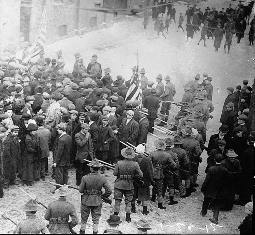 |
On Jan. 1, 1912, the Massachusetts fifty-four-hour law went into effect, reducing the weekly maximum hours of labor for women and for minors under eighteen from fifty-six to fifty-four. When textile manufacturers in Lawrence, Mass., cut the wages of their employees to correspond with the reduction in hours, the mill workers went on strike. At the time, the mills in Lawrence employed some 30,000 to 35,000 workers; of these, an estimated 2,500 were members of craft unions and roughly 300 were paid-up members of the IWW. The strike began on Jan. 11 and, by the evening of Jan. 12, some 10,000 workers, many of them unorganized, non-English-speaking immigrants from southern and eastern Europe, had walked off their jobs. Led by IWW organizer |
Joseph Ettor, who arrived in Lawrence on Jan. 13 and chaired the strike committee, the strikers demanded a 15 percent wage increase, double pay for overtime work, elimination of the bonus system used to speed up production, and the reemployment of strikers. The mill owners refused to meet with the strike committee or submit their case to the state board of conciliation and arbitration, and, for their part, the strikers refused Gov. Eugene Foss's request to return to work for thirty days at their old wages while he attempted to mediate the dispute. Tensions erupted in street violence on Jan. 29, leaving one striker dead. Ettor and Arturo Giovannitti, another IWW strike leader, were arrested as accessories to murder and imprisoned until their trial and acquittal in November. Their arrest galvanized supporters outside Lawrence, who sustained the strike through donations, and William Haywood, William Trautmann, and Elizabeth Gurley Flynn took up leadership of the walkout. The strike committee organized a system of relief committees and in February began encouraging strikers to send their children to foster parents in New York and other cities, a stratagem that garnered additional sympathy and support. On Feb. 24 the police and militia, attempting to prevent the departure of additional children, attacked a crowd of children and parents and arrested a number of them. The publicity that resulted compelled the governor, Congress, and the U.S. Bureau of Labor to investigate the situation in Lawrence. On Mar. 1, with over 20,000 textile workers on strike and public opinion clearly on the side of the strikers, the American Woolen Co. offered a 5 to 7 percent wage increase, which was accepted by the United Textile Workers of America and other craft unions that had joined the strike in early February. The proposal was rejected by the strike committee, however, which negotiated a settlement that included a 5 percent wage increase for piece workers, 5 to 20 percent increases for hourly workers, time and a quarter for overtime, more frequent payment of bonuses, and no discrimination against strikers. The strike at most mills ended on Mar. 14. |